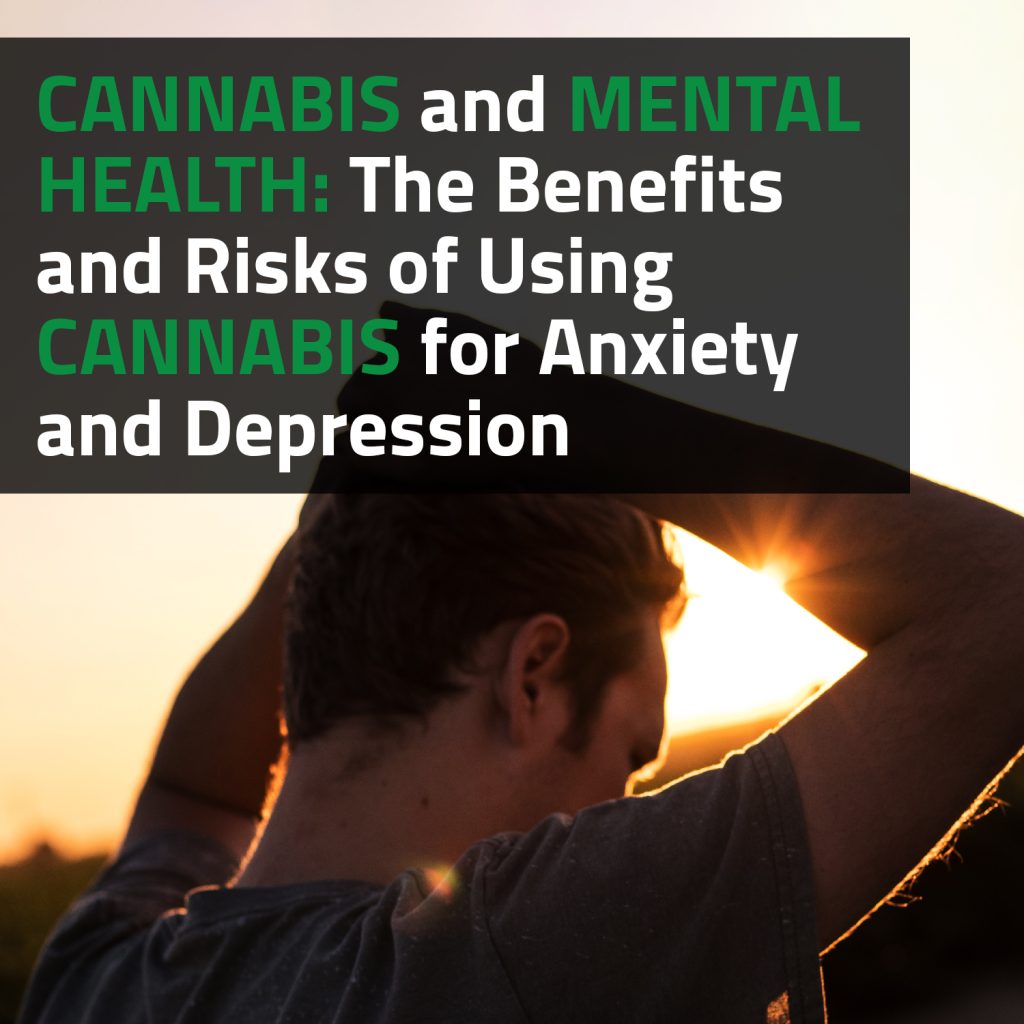In recent years, there has been growing interest in the potential benefits and risks of using cannabis as a treatment option for anxiety and depression. As the stigma surrounding cannabis diminishes and its legal status undergoes changes in various countries, people are increasingly turning to this plant as a potential remedy for their mental health challenges.
While some proponents of cannabis argue for its efficacy in alleviating symptoms of anxiety and depression, others express concerns about its potential risks and adverse effects. Consequently, it becomes crucial to delve into the topic of cannabis and mental health, carefully examining both its potential benefits and associated risks.
An In-Depth Look At Anxiety And Depression
Anxiety and depression are two of the most prevalent mental health conditions, affecting millions of people worldwide. While they are distinct disorders, they often coexist and share certain symptoms and underlying mechanisms.
Both anxiety and depression are complex disorders with multifactorial causes, such as:
- Genetic predisposition
- Environmental factors
- Brain chemistry imbalances
- Life events
Additionally, individuals with anxiety or depression may have alterations in the endocannabinoid system, the same system that interacts with cannabinoids in cannabis. Some individuals report subjective improvements in mood, relaxation, and a reduction in anxiety and depressive symptoms after using cannabis. Cannabinoids like CBD have shown promise in preclinical and early clinical studies as potential anti-anxiety and antidepressant agents.
However, it is crucial to note that the relationship between cannabis and mental health is complex and not fully understood. Some studies suggest that cannabis use may exacerbate anxiety and depression symptoms, especially in individuals prone to these conditions. Additionally, the psychoactive component of cannabis, THC, can induce short-term anxiety and impair cognitive function in certain individuals. Furthermore, the long-term effects of cannabis use on anxiety and depression are still being investigated. While some studies suggest a potential link between heavy, chronic cannabis use and an increased risk of developing mental health problems, including anxiety and depression, more research is needed to establish causality and identify specific risk factors.
Debunking Myths Of Cannabis
Cannabis has long been a subject of misconceptions and myths. As attitudes and laws surrounding cannabis evolve, it is essential to separate fact from fiction. Here are some common myths about cannabis debunked.
Myth 1: Cannabis Is A gateway drug
One of the most persistent myths is that using cannabis will inevitably lead to the use of harder drugs. However, research does not support this claim. The majority of cannabis users do not progress to using other illicit substances. The gateway theory has been largely discredited, with factors like individual predisposition, social environment, and personal circumstances playing more significant roles in drug use patterns.
Myth 2: Cannabis Kills Brain Cells
It is often claimed that cannabis use kills brain cells, leading to permanent cognitive impairment. However, this is not supported by scientific evidence. While cannabis can temporarily impair cognitive function, especially with acute intoxication, there is no substantial evidence to suggest that it causes long-term brain cell death.
Myth 3: Cannabis Is Highly Addictive
While cannabis can be habit-forming for some individuals, it is incorrect to label it as highly addictive. The addictive potential of cannabis is lower compared to substances like nicotine or opioids. According to the National Institute on Drug Abuse (NIDA), around 9% of cannabis users may develop cannabis use disorder, which is significantly lower than the addiction rates observed with other substances.
Myth 4: All Cannabis Strains Have The Same Effects
Cannabis is a complex plant with various strains containing different combinations of cannabinoids, including THC and CBD, as well as other compounds. These differences in chemical composition can result in varying effects. Some strains may be more sedating, while others have a more energising effect or provide specific therapeutic benefits. The effects of cannabis are not a one-size-fits-all experience, and individual responses often vary.
Myth 5: Cannabis Has No Medical Value
Historically, cannabis has been stigmatised and dismissed as lacking medical value. However, scientific research has uncovered numerous potential therapeutic applications of cannabis. It has shown promise in alleviating symptoms of conditions such as chronic pain, multiple sclerosis, epilepsy, and chemotherapy-induced nausea. Cannabinoids like CBD have also demonstrated potential for treating certain forms of epilepsy. However, more extensive research is needed to fully understand the medical potential of cannabis and its constituents.
Debunking these myths is crucial for fostering informed discussions and policies surrounding cannabis. It is important to rely on scientific evidence, ongoing research, and expert guidance when assessing the risks, benefits, and appropriate use of cannabis.
Potential Benefits Of Cannabis For Anxiety And Depression
While research on cannabis and mental health is still emerging and further investigation is needed, some studies and anecdotal evidence suggest several potential ways in which cannabis may be beneficial for anxiety and depression.
- Relaxation and stress reduction: Strains high in CBD have been reported to induce relaxation and reduce stress levels. CBD has shown promise as an anxiolytic agent, potentially alleviating symptoms of anxiety by modulating the endocannabinoid system and influencing serotonin receptors in the brain
- Mood enhancement: THC, the psychoactive component of cannabis, can potentially stimulate the release of dopamine and activate reward pathways in the brain, leading to temporary euphoria and a sense of well-being
- Sleep improvement: Both anxiety and depression can disrupt sleep patterns, leading to insomnia or poor sleep quality. Cannabis has been reported to have sedative effects, aiding in sleep initiation and potentially improving sleep duration and quality
- Distraction and coping mechanism: Engaging in activities that provide a distraction or act as a coping mechanism can be beneficial for individuals with anxiety and depression. Some individuals may find that cannabis use helps them momentarily shift their focus away from distressing thoughts or emotion
- Enhanced social interactions: Social anxiety can be a significant challenge for individuals with anxiety and depression. In some cases, cannabis use has been associated with increased sociability, reduced inhibitions, and improved social interactions
CBD And Mental Health
While research on CBD and mental health is still evolving, preliminary studies indicate its potential as an antidepressant. CBD’s impact on serotonin receptors and its anti-inflammatory properties may contribute to its potential benefits for depression. CBD has also shown promise in addressing sleep disorders like insomnia by promoting relaxation and potentially modulating sleep cycles.
In an attempt to better understand psychosis and schizophrenia, CBD has been studied for its antipsychotic properties. Research suggests that CBD may help reduce symptoms in individuals with schizophrenia. Furthermore, CBD has been explored as a potential aid in managing addiction and substance use disorders by reducing drug cravings, withdrawal symptoms, and associated anxiety.
It is important to note that individual responses to CBD will often vary, and it may not be effective for everyone. CBD should not be considered a replacement for conventional treatments, and consulting with a healthcare professional knowledgeable in CBD use is recommended. Quality control of CBD products is essential, and sourcing from reputable manufacturers is advised.
THC And Mental Health
THC (delta-9-tetrahydrocannabinol), the psychoactive component of cannabis, has complex effects on mental health. Higher doses can induce anxiety, paranoia, and increased risk of psychosis. THC can also affect mood, cognition, and has addictive potential.
It is important to note that the effects of THC on mental health can be influenced by various factors, and individual responses may vary. THC’s potential risks should be carefully considered, particularly for individuals with pre-existing mental health conditions or a susceptibility to certain adverse effects.
When considering THC for mental health purposes, it is advisable to consult with a healthcare professional knowledgeable in cannabis use. They can provide guidance on potential risks, appropriate dosages, and help navigate potential interactions with other treatments. Additionally, sourcing cannabis products from reputable and regulated sources is crucial to ensure quality and safety.
In conclusion, the relationship between cannabis and mental health, specifically anxiety and depression, is complex. While some individuals may find temporary relief from symptoms through the relaxation, mood-enhancing, and sleep-improving properties of cannabis, it is crucial to approach its use with caution. Cannabis treatment could be extremely helpful for managing anxiety and depression. The potential benefits should be weighed against the risks, and it is always a good idea to consult a medical health professional. Be sure to check out Cannarite for the latest information on cannabis.









